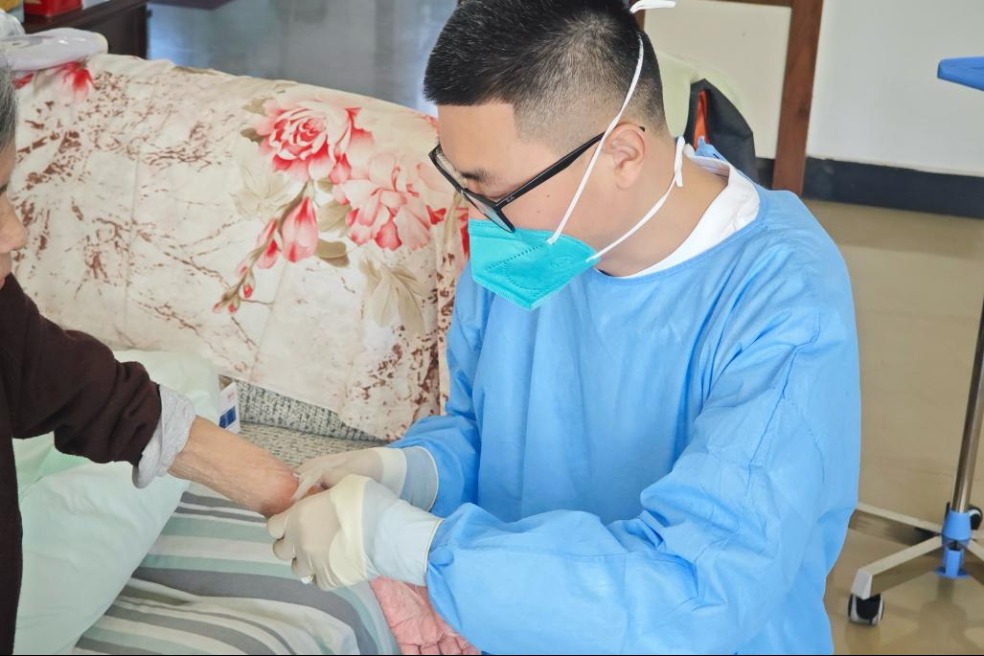Quadruple amputee controls computer with thoughts in groundbreaking China BMI trial

A quadruple amputee has successfully operated computer games using only thoughts through a brain-machine interface device, marking a significant milestone in BMI technology development in China.
The participant, who lost all four limbs in a high-voltage electrical accident, received a BMI implant at Shanghai's Huashan Hospital affiliated with Fudan University on March 25. The device was developed by StairMed, a Shanghai-based medical technology company.
The procedure involved inserting two ultra-flexible electrodes — approximately one-hundredth the thickness of human hair — into his brain. These electrodes connect to a 1-yuan-coin-sized implant embedded in his skull that wirelessly transmits brain signals to external devices, converting neural activity into computer commands.
Following one month of training, the participant achieved control comparable to an able-body's touch pad operation, including playing chess and racing games. "I can now control the computer with my thoughts. It feels like my intentions directly translate into actions," according to the participant.
This marks China's first invasive BMI first-in-man clinical trial, making StairMed the second company globally, after Elon Musk-backed Neuralink, to reach the clinical trial stage for invasive BMI technology and prepare for the clinic application.
"The first-in-man clinical trial is an important milestone toward clinical application," said Zhao Zhengtuo, a cofounder of StairMed. "Through this trial, we have achieved complete product certainty with a small sample size. The next step is to increase the number of participants for statistically significant results."
StairMed's implant, measuring 26 millimeter in diameter and less than 6mm in thickness, is approximately half the thickness of Neuralink's device, while the electrodes have a cross-sectional area just one-fifth to one-seventh of Neuralink's, said Li Xue, another StairMed cofounder.
Installation requires only a 3-5mm skull perforation, with sensors placed 5-8mm deep in the brain, and the implant sits flush with the skull and is virtually undetectable under the scalp.
"It requires only a shallow groove in the skull rather than complete penetration, minimizing tissue disruption while improving the BMI's clinical acceptability and application scope," said Li.
While Neuralink's first-generation product features 64 electrodes and 1,024 channels, StairMed's system achieves effective device control with just two electrodes and 64 channels, with no observed electrode migration in trials.
StairMed plans to conduct three to four prospective clinical trials this year, followed by larger multicenter registration trials with 30-40 participants in early 2026. Market entry is anticipated around 2028, pending regulatory approvals.
Future applications may include control of mechanical arms, wheelchairs, and embodied intelligent robots, according to Zhao.
The advancement comes as China's BMI research and development has been accelerating. In March, the National Healthcare Security Administration established new pricing categories for BMI procedures, signaling potential clinical implementation in the near future. Various local governments, including Beijing and Shanghai, have implemented policies supporting BMI technology development and industrialization.
Founded in 2021, StairMed secured 350 million yuan ($48.5 million) in Series B funding in February. The company has established a 2,000-square-meter production facility in Shanghai's Pudong New Area, including 300 square meters of clean rooms.
- Quadruple amputee controls computer with thoughts in groundbreaking China BMI trial
- 12th China Police Equipment Exhibition set to open in Beijing
- China completes legal framework for foreign-related affairs
- Changchun's historic street blends culture with youth
- Harbin Institute hosts 10th doctoral student mass wedding
- Bougainvillea flowers in full bloom in Chongqing





































